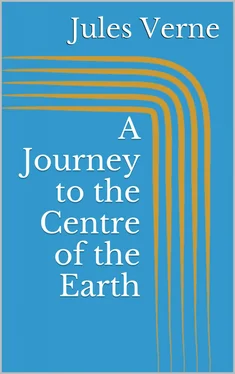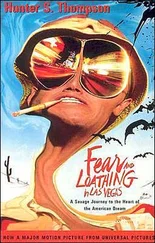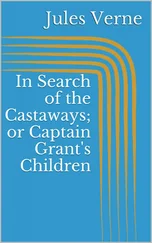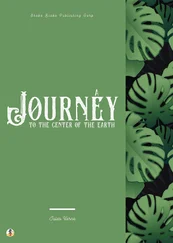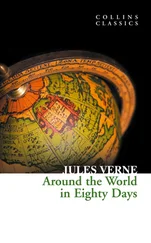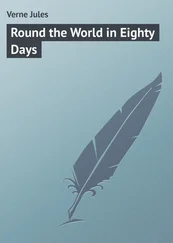Then, when our leisure hours came, we used to go out together and turn into the shady avenues by the Alster, and went happily side by side up to the old windmill, which forms such an improvement to the landscape at the head of the lake. On the road we chatted hand in hand; I told her amusing tales at which she laughed heartilv. Then we reached the banks of the Elbe, and after having bid good-bye to the swan, sailing gracefully amidst the white water lilies, we returned to the quay by the steamer.
That is just where I was in my dream, when my uncle with a vehement thump on the table dragged me back to the realities of life.
"Come," said he, "the very first idea which would come into any one's head to confuse the letters of a sentence would be to write the words vertically instead of horizontally."
"Indeed!" said I.
"Now we must see what would be the effect of that, Axel; put down upon this paper any sentence you like, only instead of arranging the letters in the usual way, one after the other, place them in succession in vertical columns, so as to group them together in five or six vertical lines."
I caught his meaning, and immediately produced the following literary wonder:
| I |
y |
l |
o |
a |
u |
| l |
o |
l |
w |
r |
b |
| o |
u |
, |
n |
G |
e |
| v |
w |
m |
d |
r |
n |
| e |
e |
y |
e |
a |
! |
"Good," said the professor, without reading them, "now set down those words in a horizontal line."
I obeyed, and with this result:
Iyloau lolwrb ou,nGe vwmdrn eeyea!
"Excellent!" said my uncle, taking the paper hastily out of my hands. "This begins to look just like an ancient document: the vowels and the consonants are grouped together in equal disorder; there are even capitals in the middle of words, and commas too, just as in Saknussemm's parchment."
I considered these remarks very clever.
"Now," said my uncle, looking straight at me, "to read the sentence which you have just written, and with which I am wholly unacquainted, I shall only have to take the first letter of each word, then the second, the third, and so forth."
And my uncle, to his great astonishment, and my much greater, read:
"I love you well, my own dear Gräuben!"
"Hallo!" cried the Professor.
Yes, indeed, without knowing what I was about, like an awkward and unlucky lover, I had compromised myself by writing this unfortunate sentence.
"Aha! you are in love with Gräuben?" he said, with the right look for a guardian.
"Yes; no!" I stammered.
"You love Gräuben," he went on once or twice dreamily. "Well, let us apply the process I have suggested to the document in question."
My uncle, falling back into his absorbing contemplations, had already forgotten my imprudent words. I merely say imprudent, for the great mind of so learned a man of course had no place for love affairs, and happily the grand business of the document gained me the victory.
Just as the moment of the supreme experiment arrived the Professor's eyes flashed right through his spectacles. There was a quivering in his fingers as he grasped the old parchment. He was deeply moved. At last he gave a preliminary cough, and with profound gravity, naming in succession the first, then the second letter of each word, he dictated me the following:
mmessvnkaSenrA.icefdoK.segnittamvrtn
ecertserrette,rotaisadva,ednecsedsadne
lacartniiilvIsiratracSarbmvtabiledmek
meretarcsilvcoIsleffenSnI
I confess I felt considerably excited in coming to the end; these letters named, one at a time, had carried no sense to my mind; I therefore waited for the Professor with great pomp to unfold the magnificent but hidden Latin of this mysterious phrase.
But who could have foretold the result? A violent thump made the furniture rattle, and spilt some ink, and my pen dropped from between my fingers.
"That's not it," cried my uncle, "there's no sense in it."
Then darting out like a shot, bowling down stairs like an avalanche, he rushed into the Königstrasse and fled.
Chapter IV.
The enemy to be starved into submission
"He is gone!" cried Martha, running out of her kitchen at the noise of the violent slamming of doors.
"Yes," I replied, "completely gone."
"Well; and how about his dinner?" said the old servant.
"He won't have any."
"And his supper?"
"He won't have any."
"What?" cried Martha, with clasped hands.
"No, my dear Martha, he will eat no more. No one in the house is to eat anything at all. Uncle Liedenbrock is going to make us all fast until he has succeeded in deciphering an undecipherable scrawl."
"Oh, my dear! must we then all die of hunger?"
I hardly dared to confess that, with so absolute a ruler as my uncle, this fate was inevitable.
The old servant, visibly moved, returned to the kitchen, moaning piteously.
When I was alone, I thought I would go and tell Gräuben all about it. But how should I be able to escape from the house? The Professor might return at any moment. And suppose he called me? And suppose he tackled me again with this logomachy, which might vainly have been set before ancient Oedipus. And if I did not obey his call, who could answer for what might happen?
The wisest course was to remain where I was. A mineralogist at Besançon had just sent us a collection of siliceous nodules, which I had to classify: so I set to work; I sorted, labelled, and arranged in their own glass case all these hollow specimens, in the cavity of each of which was a nest of little crystals.
But this work did not succeed in absorbing all my attention. That old document kept working in my brain. My head throbbed with excitement, and I felt an undefined uneasiness. I was possessed with a presentiment of coming evil.
In an hour my nodules were all arranged upon successive shelves. Then I dropped down into the old velvet armchair, my head thrown back and my hands joined over it. I lighted my long crooked pipe, with a painting on it of an idle-looking naiad; then I amused myself watching the process of the conversion of the tobacco into carbon, which was by slow degrees making my naiad into a negress. Now and then I listened to hear whether a well-known step was on the stairs. No. Where could my uncle be at that moment? I fancied him running under the noble trees which line the road to Altona, gesticulating, making shots with his cane, thrashing the long grass, cutting the heads off the thistles, and disturbing the contemplative storks in their peaceful solitude.
Would he return in triumph or in discouragement? Which would get the upper hand, he or the secret? I was thus asking myself questions, and mechanically taking between my fingers the sheet of paper mysteriously disfigured with the incomprehensible succession of letters I had written down; and I repeated to myself "What does it all mean?"
I sought to group the letters so as to form words. Quite impossible! When I put them together by twos, threes, fives or sixes, nothing came of it but nonsense. To be sure the fourteenth, fifteenth and sixteenth letters made the English word 'ice'; the eighty-third and two following made 'sir'; and in the midst of the document, in the second and third lines, I observed the words, "rots," "mutabile," "ira," "net," "atra."
"Come now," I thought, "these words seem to justify my uncle's view about the language of the document. In the fourth line appeared the word "luco", which means a sacred wood. It is true that in the third line was the word "tabiled", which looked like Hebrew, and in the last the purely French words "mer", "arc", "mere.""
All this was enough to drive a poor fellow crazy. Four different languages in this ridiculous sentence! What connection could there possibly be between such words as ice, sir, anger, cruel, sacred wood, changeable, mother, bow, and sea? The first and the last might have something to do with each other; it was not at all surprising that in a document written in Iceland there should be mention of a sea of ice; but it was quite another thing to get to the end of this cryptogram with so small a clue. So I was struggling with an insurmountable difficulty; my brain got heated, my eyes watered over that sheet of paper; its hundred and thirty-two letters seemed to flutter and fly around me like those motes of mingled light and darkness which float in the air around the head when the blood is rushing upwards with undue violence. I was a prey to a kind of hallucination; I was stifling; I wanted air. Unconsciously I fanned myself with the bit of paper, the back and front of which successively came before my eyes. What was my surprise when, in one of those rapid revolutions, at the moment when the back was turned to me I thought I caught sight of the Latin words "craterem," "terrestre," and others.
Читать дальше
